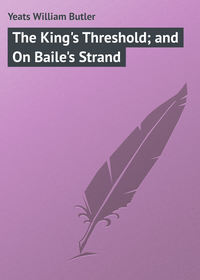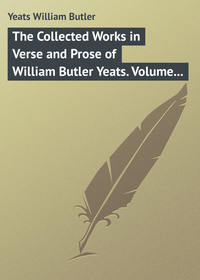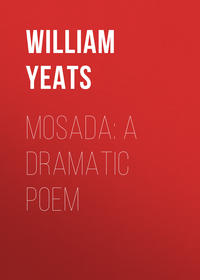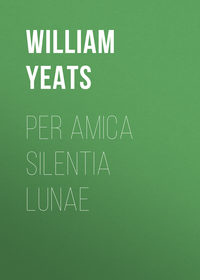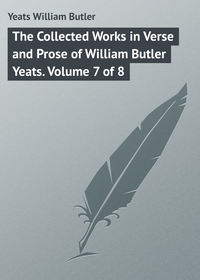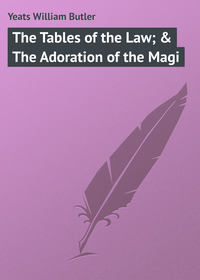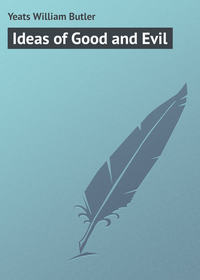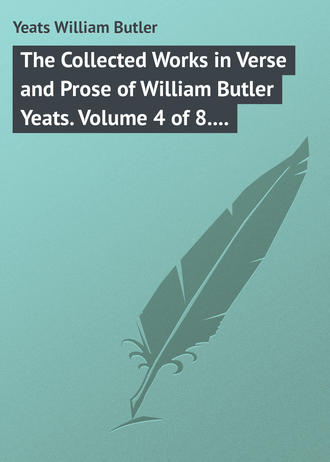 полная версия
полная версияThe Collected Works in Verse and Prose of William Butler Yeats. Volume 4 of 8. The Hour-glass. Cathleen ni Houlihan. The Golden Helmet. The Irish Dramatic Movement
If the Diarmuid and Grania and the Casadh an t-Sugain are not well constructed, it is not because Mr. Moore and Dr. Hyde and myself do not understand the importance of construction, and Mr. Martyn has shown by the triumphant construction of The Heather Field how much thought he has given to the matter; but for the most part our Irish plays read as if they were made without a plan, without a ‘scenario,’ as it is called. European drama began so, but the European drama had centuries for its growth, while our art must grow to perfection in a generation or two if it is not to be smothered before it is well above the earth by what is merely commercial in the art of England.
Let us learn construction from the masters, and dialogue from ourselves. A relation of mine has just written me a letter, in which he says: ‘It is natural to an Irishman to write plays, he has an inborn love of dialogue and sound about him, of a dialogue as lively, gallant, and passionate as in the times of great Eliza. In these days an Englishman’s dialogue is that of an amateur, that is to say, it is never spontaneous. I mean in real life. Compare it with an Irishman’s, above all a poor Irishman’s, reckless abandonment and naturalness, or compare it with the only fragment that has come down to us of Shakespeare’s own conversation.’ (He is remembering a passage in, I think, Ben Jonson’s Underwoods.) ‘Petty commerce and puritanism have brought to the front the wrong type of Englishman; the lively, joyous, yet tenacious man has transferred himself to Ireland. We have him and we will keep him unless the combined nonsense of … and … and … succeed in suffocating him.’
In Dublin the other day I saw a poster advertising a play by a Miss … under the patronage of certain titled people. I had little hope of finding any reality in it, but I sat out two acts. Its dialogue was above the average, though the characters were the old rattle-traps of the stage, the wild Irish girl, and the Irish servant, and the bowing Frenchman, and the situations had all been squeezed dry generations ago. One saw everywhere the shadowy mind of a woman of the Irish upper classes as they have become to-day, but under it all there was a kind of life, though it was but the life of a string and a wire. I do not know who Miss … is, but I know that she is young, for I saw her portrait in a weekly paper, and I think that she is clever enough to make her work of some importance. If she goes on doing bad work she will make money, perhaps a great deal of money, but she will do a little harm to her country. If, on the other hand, she gets into an original relation with life, she will, perhaps, make no money, and she will certainly have her class against her.
The Irish upper classes put everything into a money measure. When anyone among them begins to write or paint they ask him ‘How much money have you made?’ ‘Will it pay?’ Or they say, ‘If you do this or that you will make more money.’ The poor Irish clerk or shopboy,2 who writes verses or articles in his brief leisure, writes for the glory of God and of his country; and because his motive is high, there is not one vulgar thought in the countless little ballad books that have been written from Callinan’s day to this. They are often clumsily written for they are in English, and if you have not read a great deal, it is difficult to write well in a language which has been long separated, from the ‘folk-speech’; but they have not a thought a proud and simple man would not have written. The writers were poor men, but they left that money measure to the Irish upper classes. All Irish writers have to choose whether they will write as the upper classes have done, not to express but to exploit this country; or join the intellectual movement which has raised the cry that was heard in Russia in the seventies, the cry ‘to the people.’
Moses was little good to his people until he had killed an Egyptian; and for the most part a writer or public man of the upper classes is useless to this country till he has done something that separates him from his class. We wish to grow peaceful crops, but we must dig our furrows with the sword.
Our plays this year will be produced by Mr. Benson at the Gaiety Theatre on October the 21st, and on some of the succeeding days. They are Dr. Douglas Hyde’s Casadh an t-Sugain, which is founded on a well known Irish story of a wandering poet; and Diarmuid and Grania, a play in three acts and in prose by Mr. George Moore and myself, which is founded on the most famous of all Irish stories, the story of the lovers whose beds were the cromlechs. The first act of Diarmuid and Grania is in the great banqueting hall of Tara, and the second and third on the slopes of Ben Bulben in Sligo. We do not think there is anything in either play to offend anybody, but we make no promises. We thought our plays inoffensive last year and the year before, but we were accused the one year of sedition, and the other of heresy.
I have called this little collection of writings Samhain, the old name for the beginning of winter, because our plays this year are in October, and because our Theatre is coming to an end in its present shape.
1902
The Irish Literary Theatre wound up its three years of experiment last October with Diarmuid and Grania, which was played by Mr. Benson’s Company, Mr. Benson himself playing Diarmuid with poetry and fervour, and Casadh an t-Sugain, played by Dr. Hyde and some members of the Gaelic League. Diarmuid and Grania drew large audiences, but its version of the legend was a good deal blamed by critics, who knew only the modern text of the story. There are two versions, and the play was fully justified by Irish and Scottish folk-lore, and by certain early Irish texts, which do not see Grania through very friendly eyes. Any critic who is interested in so dead a controversy can look at the folk-tales quoted by Campbell in, I think, West Highland Superstitions, and at the fragment translated by Kuno Meyer, at page 458 of Vol. I. of Zeitschrift für Keltische Philologie. Dr. Hyde’s play, on the other hand, pleased everybody, and has been played a good many times in a good many places since. It was the first play in Irish played in a theatre, and did much towards making plays a necessary part in Irish propaganda.
The Irish Literary Theatre has given place to a company of Irish actors. Its Committee saw them take up the work all the more gladly because it had not formed them or influenced them. A dramatic society with guarantors and patrons can never have more than a passing use, because it can never be quite free; and it is not successful until it is able to say it is no longer wanted. Amateur actors will perform for Cumann-na-Gael plays chosen by themselves, and written by A.E., by Mr. Cousins, by Mr. Ryan, by Mr. MacGinlay and by myself. These plays will be given at the Antient Concert Rooms at the end of October, but the National Theatrical Company will repeat their successes with new work in a very little hall they have hired in Camden Street. If they could afford it they would have hired some bigger house, but, after all, M. Antoine founded his Théâtre Libre with a company of amateurs in a hall that only held three hundred people.
The first work of theirs to get much attention was their performance, last spring, at the invitation of Inghinidhe h-Eireann of A.E.’s Deirdre, and my Cathleen ni Houlihan. They had Miss Maud Gonne’s help, and it was a fine thing for so beautiful a woman to consent to play my poor old Cathleen, and she played with nobility and tragic power. She showed herself as good in tragedy as Dr. Hyde is in comedy, and stirred a large audience very greatly. The whole company played well, too, but it was in Deirdre that they interested me most. They showed plenty of inexperience, especially in the minor characters, but it was the first performance I had seen since I understood these things in which the actors kept still enough to give poetical writing its full effect upon the stage. I had imagined such acting, though I had not seen it, and had once asked a dramatic company to let me rehearse them in barrels that they might forget gesture and have their minds free to think of speech for a while. The barrels, I thought, might be on castors, so that I could shove them about with a pole when the action required it. The other day I saw Sara Bernhardt and De Max in Phèdre, and understood where Mr. Fay, who stage-manages the National Theatrical Company, had gone for his model.3 For long periods the performers would merely stand and pose, and I once counted twenty-seven quite slowly before anybody on a fairly well-filled stage moved, as it seemed, so much as an eye-lash. The periods of stillness were generally shorter, but I frequently counted seventeen, eighteen or twenty before there was a movement. I noticed, too, that the gestures had a rhythmic progression. Sara Bernhardt would keep her hands clasped over, let us say, her right breast for some time, and then move them to the other side, perhaps, lowering her chin till it touched her hands, and then, after another long stillness, she would unclasp them and hold one out, and so on, not lowering them till she had exhausted all the gestures of uplifted hands. Through one long scene De Max, who was quite as fine, never lifted his hand above his elbow, and it was only when the emotion came to its climax that he raised it to his breast. Beyond them stood a crowd of white-robed men who never moved at all, and the whole scene had the nobility of Greek sculpture, and an extraordinary reality and intensity. It was the most beautiful thing I had ever seen upon the stage, and made me understand, in a new way, that saying of Goethe’s which is understood everywhere but in England, ‘Art is art because it is not nature.’ Of course, our amateurs were poor and crude beside those great actors, perhaps the greatest in Europe, but they followed them as well as they could, and got an audience of artisans, for the most part, to admire them for doing it. I heard somebody who sat behind me say, ‘They have got rid of all the nonsense.’
I thought the costumes and scenery, which were designed by A.E. himself, good, too, though I did not think them simple enough. They were more simple than ordinary stage costumes and scenery, but I would like to see poetical drama, which tries to keep at a distance from daily life that it may keep its emotion untroubled, staged with but two or three colours. The background, especially in small theatres, where its form is broken up and lost when the stage is at all crowded, should, I think, be thought out as one thinks out the background of a portrait. One often needs nothing more than a single colour with perhaps a few shadowy forms to suggest wood or mountain. Even on a large stage one should leave the description of the poet free to call up the martlet’s procreant cradle or what he will. But I have written enough about decorative scenery elsewhere, and will probably lecture on that and like matters before we begin the winter’s work.
The performances of Deirdre and Cathleen ni Houlihan, which will be repeated in the Antient Concert Rooms, drew so many to hear them that great numbers were turned away from the doors of St. Theresa’s Hall. Like the plays of the Irish Literary Theatre, they started unexpected discussion. Mr. Standish O’Grady, who had done more than any other to make us know the old legends, wrote in his All Ireland Review that old legends could not be staged without danger of ‘banishing the soul of the land.’ The old Irish had many wives for instance, and one had best leave their histories to the vagueness of legend. How could uneducated people understand heroes who lived amid such different circumstances? And so we were to ‘leave heroic cycles alone, and not to bring them down to the crowd.’ A.E. replied in the United Irishman with an impassioned letter. ‘The old, forgotten music’ he writes about in his letter is, I think, that regulated music of speech at which both he and I have been working, though on somewhat different principles. I have been working with Miss Farr and Mr. Arnold Dolmetsch, who has made a psaltery for the purpose, to perfect a music of speech which can be recorded in something like ordinary musical notes; while A.E. has got a musician to record little chants with intervals much smaller than those of modern music.
After the production of these plays the most important Irish dramatic event was, no doubt, the acting of Dr. Hyde’s An Posadh, in Galway. Through an accident it had been very badly rehearsed, but his own acting made amends. One could hardly have had a play that grew more out of the life of the people who saw it. There may have been old men in that audience who remembered its hero the poet Raftery, and there was nobody there who had not come from hearing his poems repeated at the Galway Feis. I think from its effect upon the audience that this play in which the chief Gaelic poet of our time celebrates his forerunner in simplicity, will be better liked in Connaught at any rate than even Casadh an t-Sugain. His Tincear agus Sidheog, acted in Mr. Moore’s garden, at the time of the Oireachtas, is a very good play, but is, I think, the least interesting of his plays as literature. His imagination, which is essentially the folk-imagination, needs a looser construction, and probably a more crowded stage. A play that gets its effect by keeping close to one idea reminds one, when it comes from the hands of a folk-poet, of Blake’s saying, that ‘Improvement makes straight roads, but the crooked roads are the roads of genius.’ The idea loses the richness of its own life, while it destroys the wayward life of his mind by bringing it under too stern a law. Nor could charming verses make amends for that second kiss in which there was profanation, and for that abounding black bottle. Did not M. Trebulet Bonhommie discover that one spot of ink would kill a swan?
Among the other plays in Irish acted during the year Father Dineen’s Tobar Draoidheachta is probably the best. He has given up the many scenes of his Creadeamh agus Gorta, and has written a play in one scene, which, as it can be staged without much trouble, has already been played in several places. One admires its naïveté as much as anything else. Father Dineen, who, no doubt, remembers how Finn mac Cumhal when a child was put in a field to catch hares and keep him out of mischief, has sent the rival lovers of his play when he wanted them off the scene for a moment, to catch a hare that has crossed the stage. When they return the good lover is carrying it by the heels, and modestly compares it to a lame jackass. One rather likes this bit of nonsense when one comes to it, for in that world of folk-imagination one thing seems as possible as another. On the other hand, there is a moment of beautiful dramatic tact. The lover gets a letter telling of the death of a relative in America, for whom he has no particular affection, and who has left him a fortune. He cannot lament, for that would be insincere, and his first words must not be rejoicing. Father Dineen has found for him the one beautiful thing he could say, ‘It’s a lonesome thing death is.’ With, perhaps, less beauty than there is in the closing scene of Creadeamh agus Gorta, the play has more fancy and a more sustained energy.
Father Peter O’Leary has written a play in his usual number of scenes which has not been published, but has been acted amid much Munster enthusiasm. But neither that or La an Amadan, which has also been acted, are likely to have any long life on our country stages. A short play, with many changes of scene, is a nuisance in any theatre, and often an impossibility on our poor little stages. Some kind of play, in English, by Mr. Standish O’Grady, has been acted in the open air in Kilkenny. I have not seen it, and I cannot understand anything by the accounts of it, except that there were magic lantern slides and actors on horseback, and Mr. Standish O’Grady as an Elizabethan night-watchman, speaking prologues, and a contented audience of two or three thousand people.
As we do not think that a play can be worth acting and not worth reading, all our plays will be published in time. Some have been printed in The United Irishman and The All Ireland Review. I have put my Cathleen ni Houlihan and a little play by Dr. Hyde into this Samhain. Once already this year I have had what somebody has called the noble pleasure of praising, and I can praise this Lost Saint with as good a conscience as I had when I wrote of Cuchulain of Muirthemne. I would always admire it, but just now, when I have been thinking that literature should return to its old habit of describing desirable things, I am in the mood to be stirred by that old man gathering up food for fowl with his heart full of love, and by those children who are so full of the light-hearted curiosity of childhood, and by that schoolmaster who has mixed prayer with his gentle punishments. It seems natural that so beautiful a prayer as that of the old saint should have come out of a life so full of innocence and peace. One could hardly have thought out the play in English, for those phrases of a traditional simplicity and of a too deliberate prettiness which become part of an old language would have arisen between the mind and the story. One might even have made something as unreal as the sentimental schoolmaster of the Scottish novelists, and how many children, who are but literary images, would one not have had to hunt out of one’s mind before meeting with those little children? Even if one could have thought it out in English one could not have written it in English, unless perhaps in that dialect which Dr. Hyde had already used in the prose narrative that flows about his Love Songs of Connaught.
Dr. Hyde has written a little play about the birth of Christ which has the same beauty and simplicity. These plays remind me of my first reading of The Love Songs of Connaught. The prose parts of that book were to me, as they were to many others, the coming of a new power into literature. I find myself now, as I found myself then, grudging to propaganda, to scholarship, to oratory, however necessary, a genius which might in modern Irish or in that idiom of the English-speaking country people discover a new region for the mind to wander in. In Ireland, where we have so much to prove and to disprove, we are ready to forget that the creation of an emotion of beauty is the only kind of literature that justifies itself. Books of literary propaganda and literary history are merely preparations for the creation or understanding of such an emotion. It is necessary to put so much in order, to clear away so much, to explain so much, that somebody may be moved by a thought or an image that is inexplicable as a wild creature.
I cannot judge the language of his Irish poetry, but it is so rich in poetical thought, when at its best, that it seems to me that if he were to write more he might become to modern Irish what Mistral was to modern Provençal. I wish, too, that he could put away from himself some of the interruptions of that ceaseless propaganda, and find time for the making of translations, loving and leisurely, like those in Beside the Fire and The Love Songs of Connaught. He has begun to get a little careless lately. Above all I would have him keep to that English idiom of the Irish-thinking people of the west which he has begun to use less often. It is the only good English spoken by any large number of Irish people to-day, and one must found good literature on a living speech. English men of letters found themselves upon the English Bible, where religious thought gets its living speech. Blake, if I remember rightly, copied it out twice, and I remember once finding a few illuminated pages of a new decorated copy that he began in his old age. Byron read it for the sake of style, though I think it did him little good, and Ruskin founded himself in great part upon it. Indeed, one finds everywhere signs of a book which is the chief influence in the lives of English children. The translation used in Ireland has not the same literary beauty, and if we are to find anything to take its place we must find it in that idiom of the poor, which mingles so much of the same vocabulary with turns of phrase that have come out of Gaelic. Even Irish writers of considerable powers of thought seem to have no better standard of English than a schoolmaster’s ideal of correctness. If their grammar is correct they will write in all the lightness of their hearts about ‘keeping in touch,’ and ‘object-lessons,’ and ‘shining examples,’ and ‘running in grooves,’ and ‘flagrant violations’ of various things. Yet, as Sainte-Beuve has said, there is nothing immortal except style. One can write well in that country idiom without much thought about one’s words, the emotion will bring the right word itself, for there everything is old and everything alive and nothing common or threadbare. I recommend to the Intermediate Board – a body that seems to benefit by advice – a better plan than any they know for teaching children to write good English. Let every child in Ireland be set to turn a leading article or a piece of what is called excellent English, written perhaps by some distinguished member of the Board, into the idiom of his own country side. He will find at once the difference between dead and living words, between words that meant something years ago, and words that have the only thing that gives literary quality – personality, the breath of men’s mouths. Zola, who is sometimes an admirable critic, has said that some of the greatest pages in French literature are not even right in their grammar, ‘They are great because they have personality.’
The habit of writing for the stage, even when it is not country people who are the speakers, and of considering what good dialogue is, will help to increase our feeling for style. Let us get back in everything to the spoken word, even though we have to speak our lyrics to the Psaltery or the Harp, for, as A.E. says, we have begun to forget that literature is but recorded speech, and even when we write with care we have begun ‘to write with elaboration what could never be spoken.’ But when we go back to speech let us see that it is either the idiom of those who have rejected, or of those who have never learned, the base idioms of the newspapers.
Mr. Martyn argued in The United Irishman some months ago that our actors should try to train themselves for the modern drama of society. The acting of plays of heroic life or plays like Cathleen ni Houlihan, with its speech of the country people, did not seem to him a preparation. It is not; but that is as it should be. Our movement is a return to the people, like the Russian movement of the early seventies, and the drama of society would but magnify a condition of life which the countryman and the artisan could but copy to their hurt. The play that is to give them a quite natural pleasure should either tell them of their own life, or of that life of poetry where every man can see his own image, because there alone does human nature escape from arbitrary conditions. Plays about drawing-rooms are written for the middle classes of great cities, for the classes who live in drawing-rooms, but if you would uplift the man of the roads you must write about the roads, or about the people of romance, or about great historical people. We should, of course, play every kind of good play about Ireland that we can get, but romantic and historical plays, and plays about the life of artisans and country people are the best worth getting. In time, I think, we can make the poetical play a living dramatic form again, and the training our actors will get from plays of country life, with its unchanging outline, its abundant speech, its extravagance of thought, will help to establish a school of imaginative acting. The play of society, on the other hand, could but train up realistic actors who would do badly, for the most part, what English actors do well, and would, when at all good, drift away to wealthy English theatres. If, on the other hand, we busy ourselves with poetry and the countryman, two things which have always mixed with one another in life as on the stage, we may recover, in the course of years, a lost art which, being an imitation of nothing English, may bring our actors a secure fame and a sufficient livelihood.


